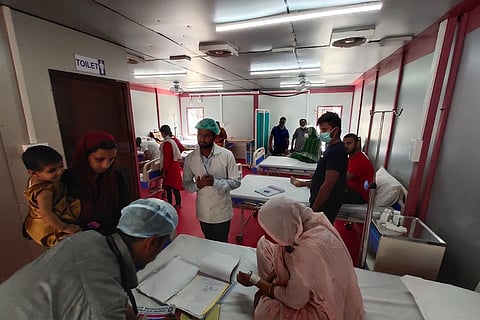

It’s already June 2021, and it feels like the year is passing by too quickly. The last almost-18 months of the COVID-19 pandemic have been about experiencing loss, uncertainty, and anxiety in some shape or form. We have all seen the scramble for medicines and medical support, especially during the second wave. I cannot help but think about those without access to proper healthcare facilities and funds and how much more difficult it must be for them.
Towards the end of 2020, things were seemingly getting back to normal around the country and we hoped we had got the pandemic situation under control. However, individuals, hospitals, private entities and other collectives started exploring ways to support communities and improve the health infrastructure in case of a spike in cases or a future pandemic. It was at this time that creators of an innovative solution decided to help address the growing need for hospital beds and access to healthcare.
A start-up, Modulus Housing, incubated at the Indian Institute of Technology, Madras (IIT-M) in 2018, had been working on easy-to-transport, knockdown prefabricated housing structures. Shreeram Ravichandran, the CEO of the start-up, was looking into the usage of these structures in solving housing problems for communities impacted by natural calamities and in relevant social and business scenarios. Shreeram and his team realised they could use their innovation to address the shortage of hospital beds in areas impacted by the pandemic.
Consulting with Doctors For You and Sree Chitra Tirunal Institute for Medical Sciences and Technology in Thiruvananthapuram in October-November 2020, Modulus Housing developed a scalable plan for a hospital with ICU beds and negative-pressure isolation rooms. To do our part in addressing the humanitarian crisis in India brought on by the pandemic, Wells Fargo stepped in to help fund Modulus Housing’s pre-fabricated hospital project called MediCab. From start to finish, the 100-bed hospital project cost Rs 2 crore and was realised in its entirety in collaboration with United Way, an NGO partner. The NGO identified Homi Bhabha Cancer Hospital and Research Centre in Muzaffarpur, Bihar, as the beneficiary of the project because of the state’s rising number of cancer patients, the highest in the country, and poor health infrastructure, which was stretched due to COVID-19 cases.
The MediCab project, conceptualised initially to provide cancer treatment, is now being used to treat COVID-19 cases and will continue to be used for treating cancer patients post pandemic. The fully equipped, pre-fabricated housing structures were transported from Chennai to Muzaffarpur in a ready-to-assemble condition. From approval to delivery, the entire project took 45 days, with the hospital being ready for use in January 2021. Today, over 1,400 patients, particularly those vulnerable to COVID-19 because of their cancer diagnosis, have found succour and hope there.
When India started to see a rise in COVID-19 cases due to the second wave, and beds, especially ICU-equipped ones, were scarce, Wells Fargo stepped in to fund two more 100-bed hospitals in Hyderabad and Bengaluru, in collaboration with Modulus Housing to strengthen the existing healthcare infrastructure in these cities.
A 100-bed hospital facility set up in Bihar
A sustainable way for corporates to support communities during the pandemic is to work with innovative start-ups that offer scalable solutions to address problems on the ground in real-time. Commitment, finding the right non-profit partners to guide the way, and focusing on solutions that will serve the community dynamically and consistently is the need of the hour for businesses.
Bandana Jha is Vice President and Head of Social Impact and Sustainability at Wells Fargo India and the Philippines.